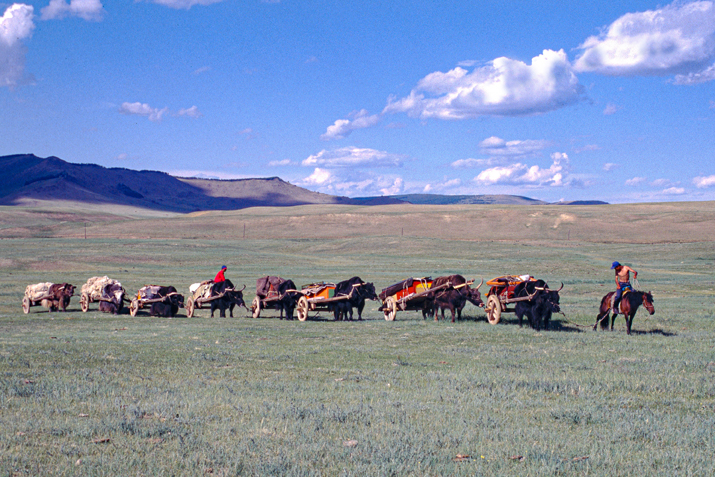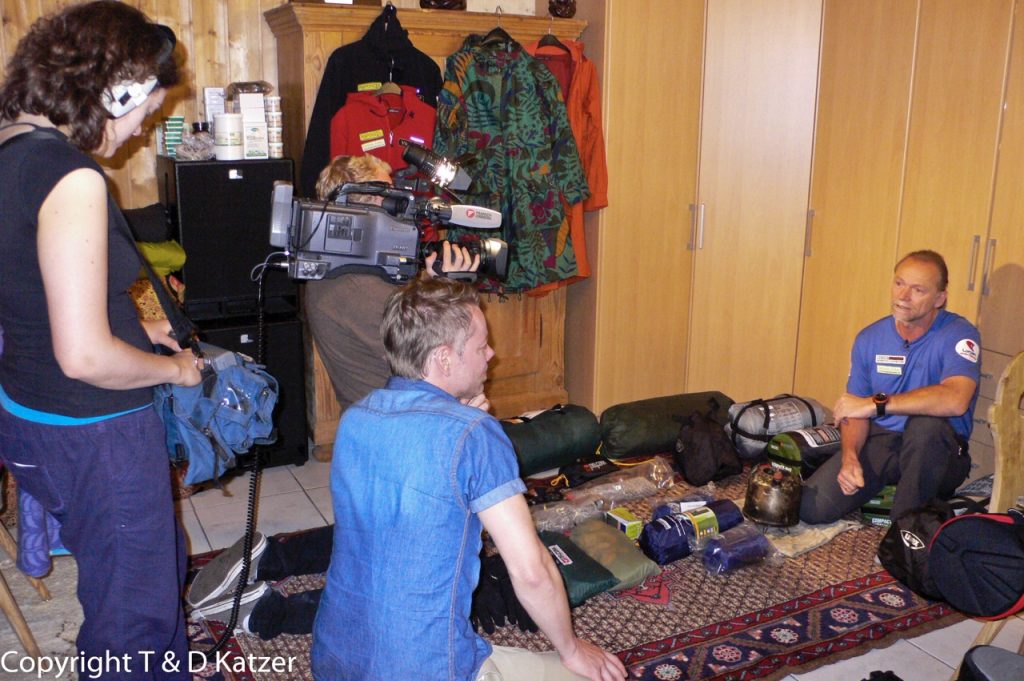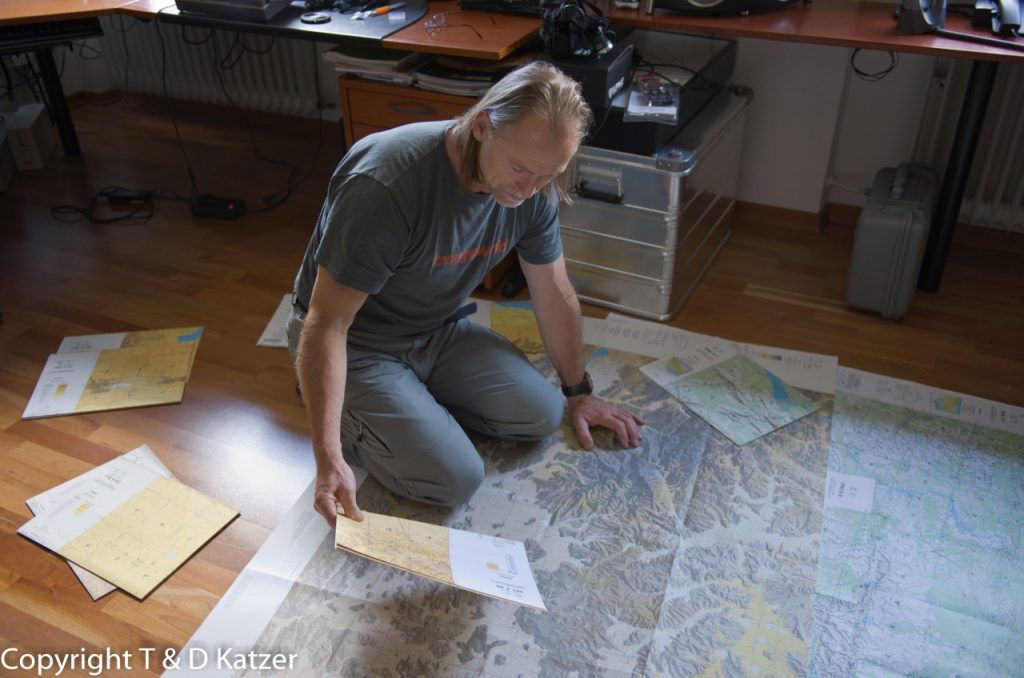
The most elaborate preparation of our travel life so far
N 47°55'30.4'' E 106°55'33.6''
Day: 0


“It will take a miracle to make it all happen,” I say. “What do you mean?” Tanja wants to know. “Well, when I think about what we have to do before we leave for Mongolia, I get downright dizzy. “Hm, we’ll manage. It’s always worked out so far.” “Yes, it will work out, except that I want to finish our new book, Power and Magic of the Taiga, with a new technician who I don’t know if he knows his trade, produce the multivision show, Original Peoples of the Earth, we have to give 30 already booked lectures this spring and we have to organize the associated marketing. In addition, there is the challenge of financing the upcoming expedition, putting together the complete equipment for summer and extreme winter, and in order to gain new sponsors we have to visit various trade fairs such as Ispo in Munich, Intersolar in Munich and Outdoor in Friedrichshafen. That alone is enough to make you break out in a sweat.
Unfortunately, there is still our website, which we have been wanting to convert to a new content management system for three years now. Although it is now one of the most extensive of its kind, our provider wants to complete it before we leave. This will also take up a lot of my time. In addition to many other tasks that we both have to deal with over the next six months, obtaining our Mongolian visas is of fundamental importance. We need a permit to stay there for one year. But as we know, there is no such visa,” I finish my list with a groan.
Six months later, a week before departure, the miracle has at least partially come true. In fact, our latest book is on sale and Thomas, our new technician, has proved himself one hundred percent. He is so good that we managed to produce not only a fantastic multivision show about the Auca Indians that I visited in 1987, but also a show about a first contact with the Yanomami Indians and a first contact with the Yali people in Western New Guinea. This means that the old slides have finally been saved from further decay and digitized.
In addition to our production work, Tanja and I found the time to visit all the planned trade fairs, signed new cooperation agreements and successfully presented our 30 presentations. Apart from a few small items, all the equipment is complete and the funding for the upcoming expedition is secured. But there are still two fly in the ointment. The new website is a long way from going online on time, which also means that our live reporting from Mongolia is not yet secured and what is even worse, our annual visa has not yet arrived. Tanja and I pray every evening that the important document will arrive on time. To be on the safe side, we have a tourist visa valid for one month in our passports and an annual visa for Russia. This means that if we don’t get permission to stay in Genghis Khan’s empire for a whole year, we would have to cross the Russian border once a month, apply for a new tourist visa for Mongolia and then re-enter Mongolia. That would be fatal for an expedition and we currently have no idea where we should leave our horses, horse-drawn carriage and equipment in this case. But we’re not there yet. We still have seven days until our departure.
The most complex and expensive visa of our big trip so far
Since October 2010, we have been making serious efforts to obtain this entry stamp, which is extremely important for us. From 2006 to 2009, we cycled 15,000 kilometers from Germany to Mongolia as part of our great journey – the longest documented expedition in history, lasting 30 years. (You can read about this in our four books, Trans-East Expedition Stages 1 to 4, available in our webshop www.denis-katzer-shop.de).
On the last leg of the Trans-East Expedition we met Togtokh in Mongolia. She is one of the descendants of the last Mongolian emperor from the 17th century. She and her friend had promised to take care of a work visa with which you can stay for up to a year. Munhoo, who owns two small hotels, gave up after a short time. Togtokh, on the other hand, showed more stamina. She visited us in February last year during a tour of Germany and brought the relevant forms with her. When she was back in Mongolia, she needed further documents, all of which had to be notarized by a notary. Passports, marriage certificate, birth certificate, annual flight ticket, bank proof of sufficient funds, proof of health insurance, confirmation from the employer that we could issue ourselves, written justification for the stay, diplomas and much more. Everything had to be translated into English. After about 7 months, the end came in September 2010. Togtokh ran into a soon impenetrable wall of bureaucrats. But she didn’t give up and put us in touch with the head of government of the province of Khövsgöl. This region is home to the reindeer nomads called Zataan, who are the destination of our expedition. The head of government was impressed by our expedition idea, but mainly because he wanted to draw the attention of tourists to his region through our public relations work. However, the authorities in Khösgöl also stretched their wings in October 2010. At that time I had regular email contact with the German-speaking secretary of the provincial chief. “We are sorry Mr. Katzer, but the effort to get a work visa for you and your wife has become too great and expensive for us. But I give them a contact to Saraa, which is an NGO. and has already managed to invite someone from abroad to Mongolia for a longer period of time.” Disappointed, I read her email and tried to reach Saraa by phone. Unfortunately without success. Then, after a few more attempts, Saraa actually answered her cell phone. Luckily, she speaks very good English. We hit it off straight away and Saraa promised to take care of the visa.
Togtokh sent all the documents he had collected to Saraa in the northern province. “We have to hurry Denis. The application process can take a long time. Besides, I’m pregnant. So there’s no time to lose,” said Saraa. Despite the short time available and her imminent confinement, we had the feeling that we could be successful with her. After about 50 emails that we exchanged over the next few weeks, the tide turned again. An acquaintance of ours has been living in Mongolia for about 5 months a year for years and has even built a house there. He put us in touch with a businessman who was supposed to take care of the visa.
To spare Saraa, I went against my gut feeling and ended the contact with her and tried our luck again. “What? Who are you?” I heard the voice of the businessman on the other side of the world ask in good German over the phone. I tried to explain what we needed. “Should I bribe someone or what?” was the answer. Even though the company owner lives directly in the capital Ulan Bator (abbreviation U.B.) and has influence to possibly apply for such a work visa more easily than Saraa, who lives two complete travel days away from the metropolis, the contact did not feel good. I secretly regretted putting the connection with Saraa on hold, but now I had to deal with the new situation.
Over the next two weeks, the businessman did not respond to any of my numerous emails. I had to call every time and was put off. When I found out on a Friday that he was too busy to take care of the visa and had handed the matter over to a friend, I stopped the action, apologized for the trouble I had already caused and said goodbye.
Afterwards, I immediately wrote a short message to Saraa: “Would you like to continue? Our contact in U.B. was overloaded with work.” “No problem Denis. I’ll be happy to help you,” was the prompt and reliable reply. From this point on, we worked even more intensively on the necessary paperwork than before. In the meantime, we had signed an employment contract. This means that from this point on we are officially employed by Saraa. Our plan is to support your NGO (private aid organization) with our marketing work and know-how. It took another four weeks for the employment contract to be signed by the head of the provincial government and the relevant authorities in Ulan Bator. Then the process continued. As Saraa is not earning much money at the moment, we had to send a flash transfer to Mongolia twice. Saraa used the US$ 290 for mail, telephone, translations and to have her husband travel to U.B. twice to organize the necessary paperwork. (It takes two full days by bus to get from Khövsgöl to U.B.). As Saraa has proved to be very reliable and trustworthy over the last few months, we had no concerns about losing the money.
After another 50 emails, many phone calls and weeks, all the collected documents were with the authorities for final signature. “Denis, from July 11 to 13, no authorities are working here. We are celebrating Naadam. (also known as the Day of the Mongolian People’s Revolution). So nothing works during this week,” says Saraa, who has now given birth to a healthy baby boy. “We’re flying on July 26. It’ll be pretty close,” I reply. Let us pray. It will work out,” she says confidently. “We already have a tourist visa. If we don’t get our work visa in time, we could enter the country on our tourist visa and arrange everything else in Mongolia,” I suggest. “For God’s sake. Under no circumstances are you allowed to enter the country on your tourist visa. That won’t work here. That would destroy the effort with the work visa,” she warns and suggests having the tourist visa invalidated immediately.
In the following week, Saraa called the embassy every day. With success. We learn that the documents were faxed to the Mongolian embassy in Berlin on Thursday, July 21. “What name did they say I should look under?” a nice employee at the Mongolian embassy asks me. “Katzer, Tanja and Denis Katzer,” I reply, suppressing my nervousness. “I can’t find anything.” “But it must be there,” I persist. “Oh yes, it really is there. Please send us your passports and we’ll give you your visa.” “Unfortunately that’s not possible. We’re flying on July 26th. My wife has to fly to Berlin tomorrow, Friday, to get her visa.” “Oh, I’m sorry about that. We’re always closed on Friday. But you are welcome to come on Monday, July 25th and apply for an express visa. It costs 120 euros per person and you’ll get it the same day. Once you are in Mongolia, you have to go to the immigration office within seven days to get your visa stamped. This is important. If they don’t, their work visa expires after the seven days and they have to leave the country immediately,” she explains.
This morning, July 25 at 3 a.m., Tanja slips out of bed. “Good luck,” I whisper tiredly as she leaves the room. “I could do with that,” she replies quietly. My mother drives her to the airport at 5:30 am.
I’m sitting at home, working for two just before I leave, eagerly awaiting Tanja’s call. At 11:00 a.m., the phone rings for the umpteenth time that day. It’s Tanja. “The visas are in our passports,” I hear her voice and I’m almost infinitely relieved. “Phew, it couldn’t be any tighter,” I say. Until Tanja arrives, I whirl around the house, jump on the phone, open the door for the various courier services that are still delivering equipment, write emails, circular emails, farewell emails, pack the rest into our large Ortlieb bags, scan documents, and so on.
At 8 p.m. Tanja is back home with the two passports and the most expensive visas of our lives so far. (approx. € 200,- for Saraa, € 250,- flight to Berlin, € 240,- express visa, annual visa Russia for emergencies approx. € 700,- two persons, € 80,- for tourist visa two persons. Total € 1.470,-)
We work until midnight to pack the rest of the extensive equipment and technology. Then we fall into our comfy beds at home, half dead with fatigue and hopefully for the last time this year.
Live reporting is supported by the companies:
MAGE SOLAR
Gesat GmbH
Satellite telephone Explorer 300 and the Duragbook from the company. Gesat are the pillars of the transmission from the steppe.

